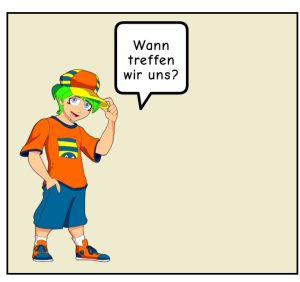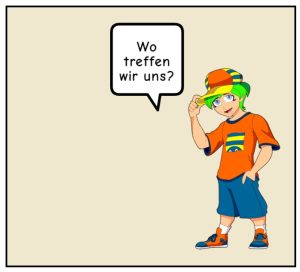4.6 Wann und wo ist der Spaß?

Hallo allerseits!
Zum Aufwärmen machen wir unseren Tagesminiplausch und eine Wiederholung.
Wiederholung
In the previous lesson, you learned to talk about having fun and different activities you can do for fun. Let’s review!
Was macht dir Spaß? Answer the question in your written journal, choosing the activities from above that you enjoy doing.
Lektionsüberblick
With our previous lesson, we started learning how to make plans with friends. We can now answer “Was machen wir?” In this lesson, we will learn how to answer “Wann treffen wir uns?” (When will we meet?) and “Wo treffen wir uns?” (Where will we meet?) In the end, you will be able to make plans with friends by being able to 1) understand questions about meeting times and respond with times of the day and 2) days of the week, and 3) understand questions about meeting locations and respond.
1) Wann treffen wir uns? – Saying times in a day
Read, listen, and repeat the question being asked.
 |
|
Here are some possible responses.
Jetzt bist du dran!
2) Wann treffen wir uns? – Saying days
Read, listen, and repeat the question again.
 |
|
Knowing the days of the week is crucial to making plans. See if you can remember the days of the week based on interacting with the Tagesminiplausch each day.
Kleiner Hinweis
In some areas of German-speaking Europe, you can hear Sonnabend in place of Samstag.
Similar to English, you can add the word am in front of any day of the week (e.g. am Freitag = on Friday). You can also say am Wochenende (on the weekend)!
Now listen to the days of the week in the video. Pay careful attention as you will be asked to say them aloud in your audio journal.
Jetzt bist du dran!
Frankfurt am Main im Blickpunkt

Frankfurt am Main hat den größten Stadtwald in Deutschland. Er ist etwa 48 Quadratkilometer groß und liegt direkt neben der Stadt und dem Flughafen. Viele Menschen gehen dort spazieren, fahren Fahrrad oder beobachten Tiere wie Rehe, Füchse, und verschiedene Vogelarten.
Frankfurt am Main has the largest urban forest in Germany. It covers approximately 48 square kilometers and is located right next to the city and the airport. Many people go there for walks, ride bikes, or observe animals such as deer, foxes, and various bird species.
3) Wo treffen wir uns? – Naming meeting locations
Read, listen, and repeat the question being asked.
 |
Here are some possible responses. Using what you know…
Jetzt bist du dran!
Zum Schluß

*As you conclude this lesson, don’t forget to check Canvas!*

Media Attribution
- Tage der Woche video from Dni tygodnia po niemiecku licensed by CC BY 4.0 International License.
Media Attributions
- 1010-1020 banner long large reduced
- “Wann treffen wir uns” Comic made at www.MakeBeliefsComix.com
- Photo of Stadtwald by dontworry, Wikipedia, CC BY-SA 3.0
- “Wo treffen wir uns” comic made at www.MakeBeliefsComix.com
- Private: confidence scale_large horizontal_updated

